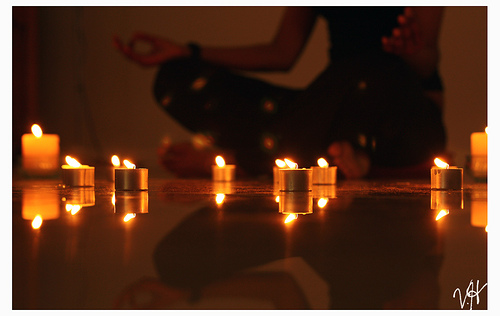I know so many people who understand the benefits of meditation (this includes myself).
We understand that our lives are transformed when we sit silently, bringing our attention to the breath. We know that we’re kinder and more compassionate when we meditate and life is easier to enjoy.
But I also know that few people consistently meditate on a regular basis (also including myself).
Why?
Because it’s hard.
Yes, there are those folks who find it easy to be disciplined and have a steady daily meditation practice and go to three month meditation retreats every year. But there are also people who win the Olympics and we know there is no point comparing ourselves to an Olympian, so why would we compare ourselves to the few who meditation comes easily to?
No, meditation is difficult.
Difficult because we need to sit with our minds without distractions.
And if your mind is anything like my mind, it’s often not a place you want to be with for a long time without some company. It’s full of self-doubt and resentment, regret and hope and it feels a little scary and out of control.
This is normal.
That’s why meditation practice needs to be, must be, can only be a place of self-compassion—otherwise meditation just becomes another battlefield, and we all have enough places to face battle…but not so many to practice self-love.
I once read an interview with Thich Naht Han where a student asked him, “When I meditate I have pain in my knee. What should I do?”
Thich Naht Han answered, “You should sit in a chair.”
The student asked, “But aren’t I supposed to work with my pain?”
And Thich Naht Han said, “Don’t you have pain enough to work with?”
And isn’t that the truth. We all have pain enough to work with.
So, we do the best we can. Two minutes of meditation here, five minutes there. Sometimes we practice for longer and it can feel like too much—maybe we cry, maybe we are shocked at what our mind brings up.
We do what we can and that is enough.
And sometimes we feel great joy and great stillness and great peace in our meditation practice.
And that is enough too.
Those blissful moments are showing our mind another path. And even though they might feel fleeting and we wish we could hold on to them longer, the stillness does have meaning.
But it doesn’t feel like it when we sit to meditate the next time, and the stillness has been replaced by the crazy mind once again and we feel like we’ve gotten nowhere. Except there’s nowhere to get. Just each experience to experience.
We live in a busy and stressful world. The amount of money we feel we need, and the things we feel we need to do in Western Society, well it’s downright overwhelming.
And that is why I am here to say something that my mindfulness class students would be shocked to hear my say.
It doesn’t matter if you meditate.
It really doesn’t.
Maybe sometimes it’s just too hard, maybe meditation feels like it’s too much. Maybe instead you just need to relax. Our stress hormones are being pushed to their limits, our flight and fight responses maxed out over VISA bills and Facebook accounts and our central nervous system’s fried from traffic and custody suits.
We are tired, burned out and pushed to our limits.
Let’s not make meditation one more stressful thing we’re supposed to do.
Instead what we need to do might look like a nap, or a Netflix binge or a glass of wine. I am giving you the ultimate permission here—this is just fine.
Relax, unwind, notice that being with your mind just feels too hard right now. Send yourself some love; you understand it feels rough, so remember that the meditation practice is always here.
And maybe tomorrow, or next week, or next month you’ll be ready to close your eyes and notice your breath and be with your mind.
And the compassion you bring to your mind when you’re not meditating will carry over and it will be there when you’re meditating, too.
Love elephant and want to go steady?
Sign up for our (curated) daily and weekly newsletters!
Editor: Catherine Monkman
Photo: Flickr



Read 0 comments and reply